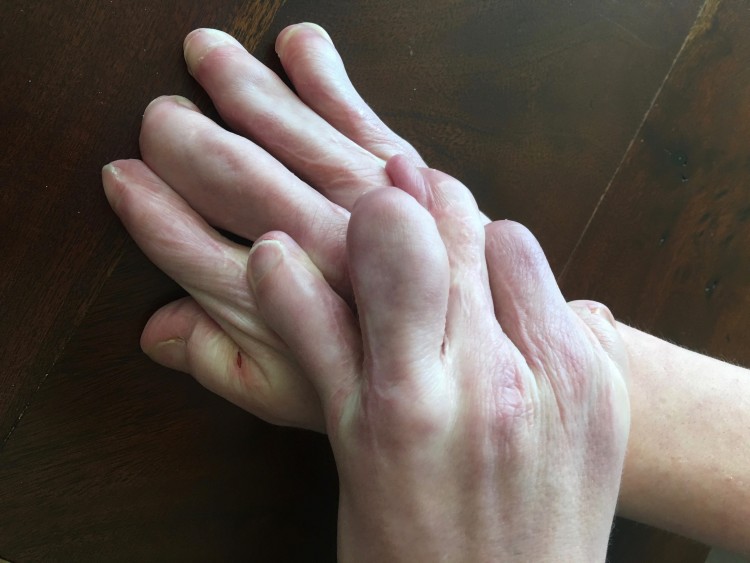
Several months ago, my 14-year-old son (born with Apert syndrome), made a comment to me about the scars on his hands and feet. I don’t remember his exact words, but they were related to his self-consciousness of his scars showing and the fact that he didn’t want people to see them. This led me to some deep thinking.
When my son was born, his hands looked as though he was wearing skin mittens. All of his bones were fused at the fingertips, except for his thumbs. His feet were only fused with the skin in between each toe, which gave them an appearance of “baby doll” feet.
We were under the care of a craniofacial team at Medical City Dallas, that included a craniofacial plastic surgeon, neurologist, anthropologist, geneticist, and a speech and language pathologist. We had an appointment to see the surgeon on the team who specialized in surgeries of the hands and feet, what they call a “syndactyly release.” As we anxiously waited for one of the plastic surgeons (not our current doctor) to give us some direction for our son, he swiftly walked into the patient room, examined his hands in a rushed check-up, but stated that he could not guarantee that he would be able to give him all 10 fingers.
I was overcome by a feeling of uneasiness. Here we were, brand new 30-something-year-old parents, who just had a child diagnosed with a syndrome with 1 out of 150,000 odds. We knew nothing about parenting, much less medical babble, so who were we to question a physician? After we got home that day my husband and I discussed it, and we both decided that something just didn’t feel right. We were not ready to accept that outcome, so we decided to get a second opinion. We called the Shrine Hospital in Dallas and made an appointment to see a surgeon. They ordered for us to come in and get X-rays of both his hands and feet. The doctor came in, looked at them and said they could try to do the separation. We asked how many cases like his had they done before, and I am pretty sure I could count them on one hand, if there were any. Again, we went back home, both feeling apprehensive. After all, this was a major deal.
This was our son. These were his hands and feet.
Immense weight fell onto our shoulders, since we felt like this was not only our chance to make the best decision possible so our son would have full function of his hands and feet, but our responsibility as advocates for our child. We’re talking about two very important body parts that determine how we function on a daily basis. Again, this prompted more discussion.
We went for a third opinion and made an appointment with another plastic surgeon who was on a different craniofacial team. We had heard great things about him, and he happened to be in the same hospital at Medical City Dallas where he had already had his previous surgeries. Right away he gave us good news that he would be able to give him all of his fingers. He was very upfront and honest when he said that Logan’s hands were going to be a hard case, due to the severity and how the bones fused — what they call “rosebud” hands. However, he felt confident for a good outcome because all the bones were present. So after two separate surgeries about three months apart, they separated his fingers and toes using skin graphs from an area on his leg.
And voila! He had all ten fingers and toes released.
Something else the doctors made us aware of with regards to his hands, is that children with Apert do not have “knuckles” or any break in the bones in their fingers, so they are unable to bend like typical fingers do. However, my son, as well as other kids with Apert, adjust and accommodate like no other! After a few years of occupational therapy, he has never let this stop him from doing what he wants to do. Realistically, he does have certain limitations, but with some accommodations and learning over time, he can maneuver a whole lot more than we expected. He has amazed us time after time.
So when I look at my son’s misshapen, scarred fingers and toes, I see beauty, strength, bravery, and courage. And yes, I am his mom, and moms see the good in their children no matter what.
I also know how these scars came to be.
And here are my deep thoughts: Could this also be you who has scars? Ones you wished you could cover up, or even a physical appearance that makes you feel ashamed? Maybe you know someone who does, or have a friend or relative that can relate. Or perhaps you have scars that are not visible to anyone else. Scars that have wounded your heart and made you feel less than worthy. It is so incredibly hard to live up to the societal standards these days.
What I want to say to them, or you, is this:
I hope you know how much you are loved.
Your scars do not define you.
Whatever scars you have, visible or invisible, let that be a reminder of the strength and courage you were given to overcome any challenges.

